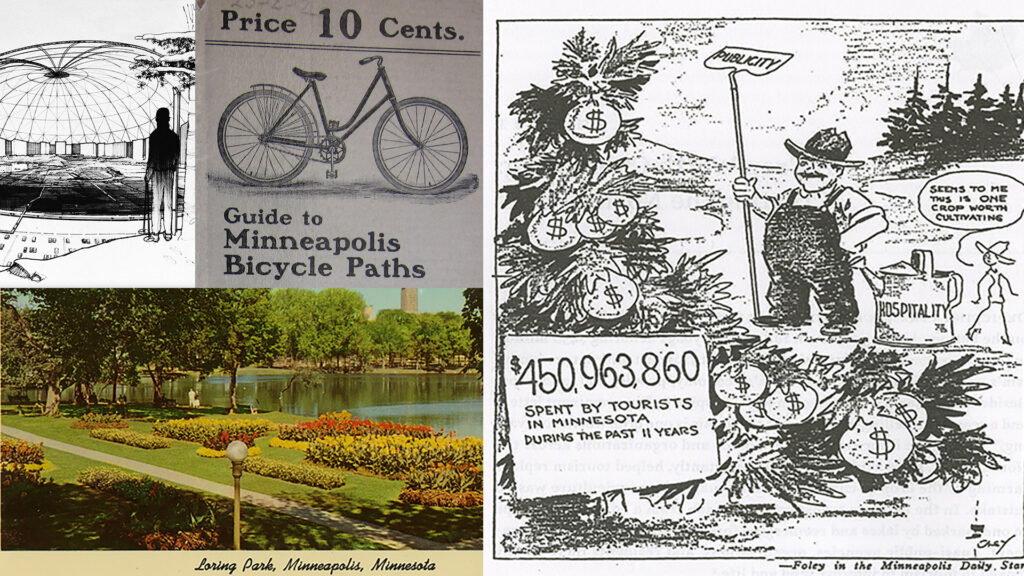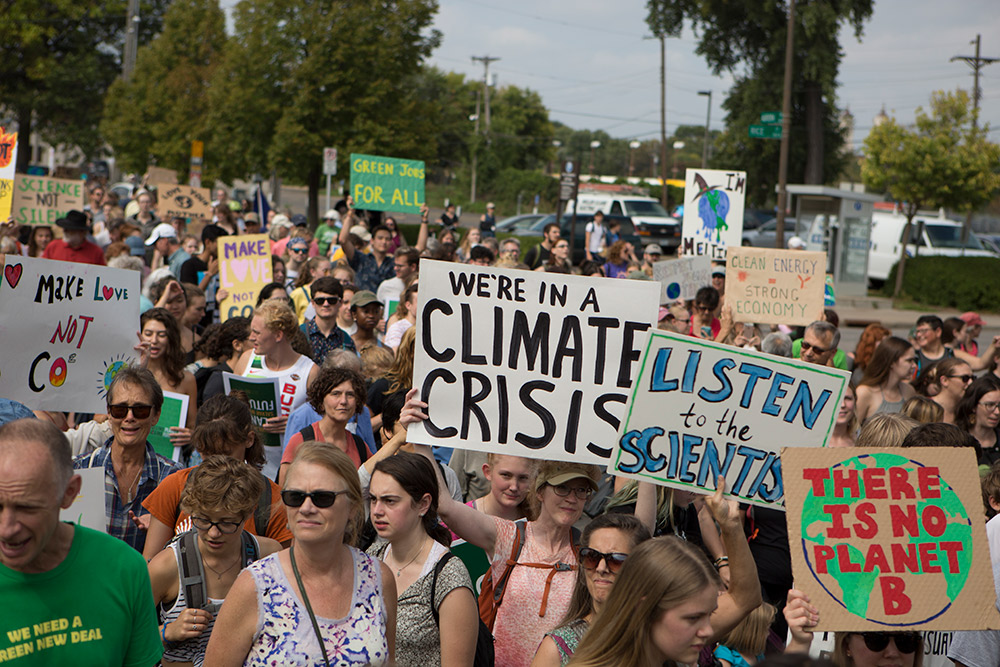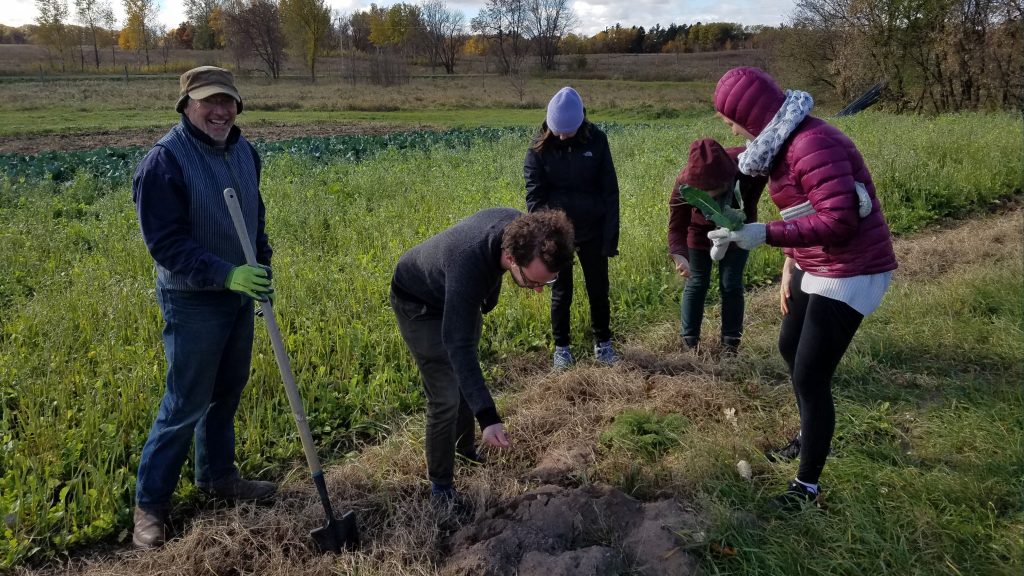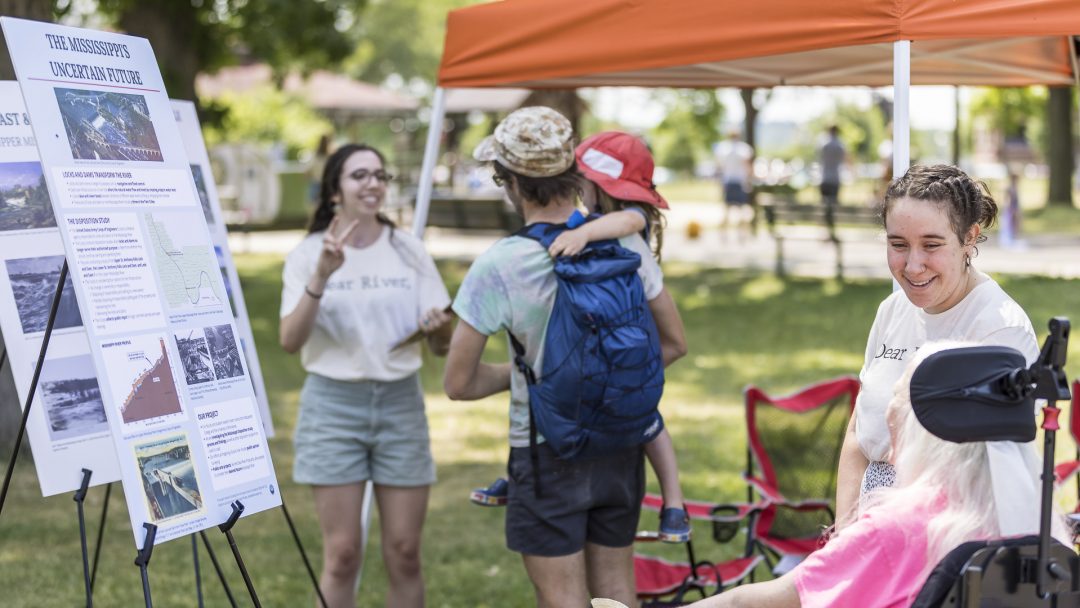

Environmental Studies
Imagining a just future for all on a changing planet
Contact
Environmental StudiesOlin-Rice Science Center, Room 249 651-696-6274
esson@macalester.edu
instagram twitter
Why major in Environmental Studies at Macalester?
In a word: Action.
For nearly fifty years, Macalester has had a dedicated and deeply interdisciplinary focus on Environmental Studies. We use case studies, problem-solving, and a community-centered approach to address environmental problems at the local, national and global levels.
Our faculty bring expertise from the humanities, social sciences, physical, and biological sciences. Our affiliated faculty in other departments come from all corners of campus, including anthropology, biology, chemistry, economics, education, geography, geology, GIS, philosophy, and physics.
Research
Our students work with faculty through summer research fellowships on tropical rainforests, climate change policy, paleoclimate, and the psychology of behavioral change.
Many students go on to conduct independent research culminating in honors theses such as how agriculture might mitigate climate change; lowering the implementation barriers to photovoltaics; and global sanitation challenges.
Life after Macalester
-
Recent Employers - 3M Company
- 4UR Ranch
- Alaska Native Tribal Health Consortium
- Allina Health
- Amazon
- BAC Local #1 MN/ND
- Bottom Line
- CBYX for Young Professionals – Germany
- City of Minneapolis
- Climate Generation: A Will Steger Legacy
- CommonBond Communities
- Coon Creek Watershed District
- County of Henrico
- Eagle Bluff Environmental Learning Center
- EarthCorps
- Earthworks Environmental, LLC
- Epic Systems
- Glacier Guides
- Great River Greening
- Heacox Hartman
- Irene Fernando for Hennepin County Commissioner District 2
- Kimley-Horn
- Lake County Soil and Water Conservation District
- Massachusetts Rivers Alliance
- Meridian Institute
- Minneapolis Park & Recreation Board
- Minnesota Pollution Control Agency
- National Economic and Social Development Board
- Parks and People Foundation
- Planned Parenthood
- Power Shift Network
- Prime Advertising and Design
- RE Tech Advisors
- Riley Purgatory Bluff Creek Watershed District
- Runa LLC
- Solate Band
- Southside Family Nurturing Center
- Stearns History Museum
- Student Conservation Association, Americorps
- Summit Public Schools
- Swallow Tail Farm
- Thomas Watson J. Foundation
- Twist Davis Group
- U.S. Forest Service
- University of California, Berkeley
- Urban Farm Colorado
- US Environmental Protection Agency (EPA)
- Utah Division of Water Quality
- Voyageurs National Park Association
- Washington County
- Windustry
- Wisconsin’s Choice
-
Recent Graduates Schools - Alfred University
- Kanazawa University Open University
- King’s College London
- Richard Gilder Graduate School, American Museum of Natural History
- Stanford Law
- UC Berkeley
- University of Iceland
- University of Minnesota/Twin Cities
- University of Wisconsin/Madison
- Vermont School of Law
After Macalester, Environmental Studies students pursue a variety of options in graduate school and employment.
Environmental Studies in the cities
*A 300-acre field study lab is only 15 minutes from campus.
200
**Number of internships within 8 miles of campus, including governmental organizations on the leading edge of urban sustainability.
Minnesota’s state capitol is 6 miles from campus, allowing students easy access to state legislators and agencies.
Join our community
We don’t just talk about environmental issues here, we also take part in them.
- EnviroThursdays—bring your bag lunch and join the community to hear from local and national experts at one of Macalester’s longest running public seminars
- EcoHouse—a living and learning residential option where students test various green technologies and lifestyle choices
- Green@Mac—aims to promote all aspects of holistic sustainability and urban gardening
- Mac Bike—bike advocacy and a repair workshop
- MacShares—a student-run cooperative that sells produce and dry bulk goods to the Macalester community at weekly pop-up sales
- Mac Sunrise—a local chapter of the Sunrise Movement, a youth-led movement promoting student advocacy around climate justice and equity
- Outing Club—offers adventure in the great outdoors through inexpensive trips and reasonable gear rental

Sustainability goals
Macalester is committed to leading by example. Our sustainability initiatives focus on achieving carbon neutrality, zero waste, and investing in campus based sustainable agriculture and fair trade.


